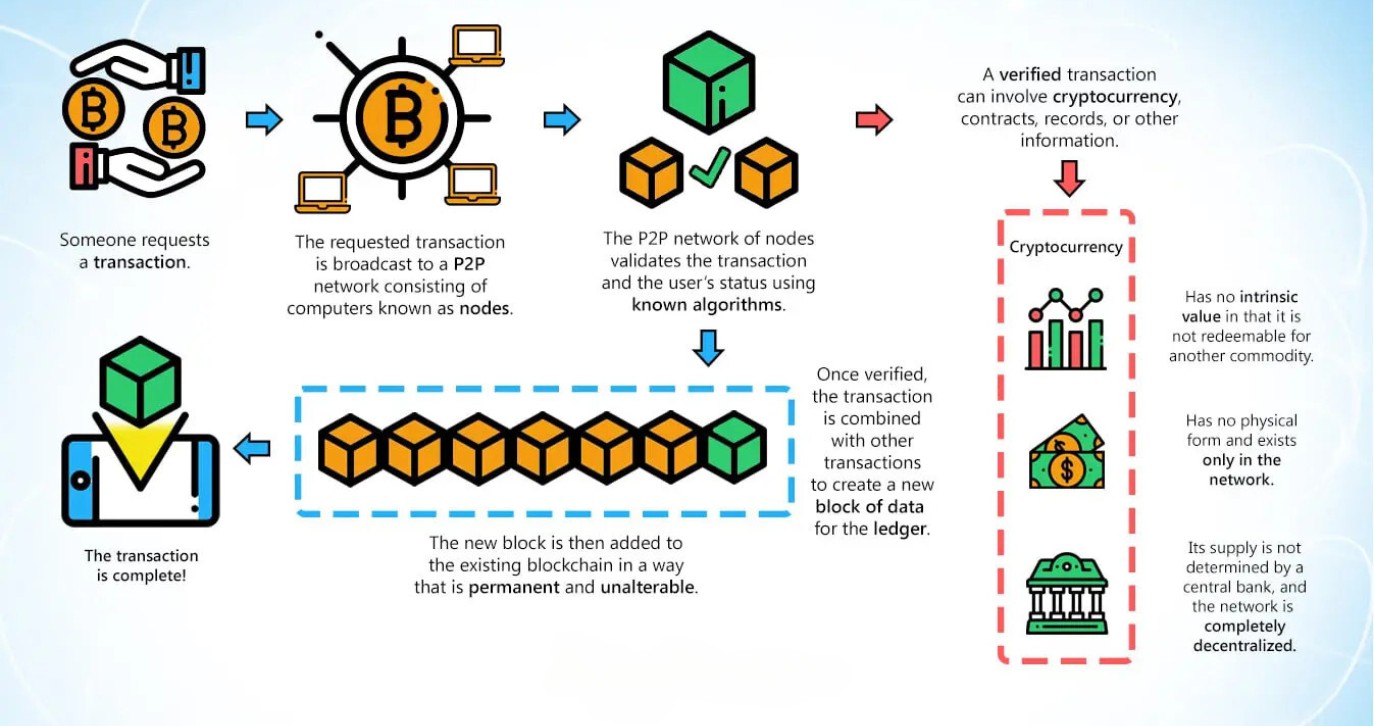Overview of Private Blockchains
A blockchain is a distributed ledger technology that allows for secure and transparent record-keeping. While public blockchains, like Bitcoin and Ethereum, are open to everyone and rely on a decentralized network of participants, private blockchains are restricted to a specific group or organization.
Private blockchains offer several key features that make them attractive to businesses and industries seeking more control and privacy over their transactions. Unlike public blockchains, which are accessible to anyone with an internet connection, private blockchains require permission to participate and access the network.
These permissioned networks typically have a consortium or central authority that manages and governs the blockchain. This centralized control allows for faster transaction processing and greater scalability. It also enables the implementation of additional security measures, such as identity verification and access control, to protect sensitive data.
Private blockchains are particularly suitable for businesses in industries where data privacy and compliance are critical, such as healthcare, finance, and supply chain management. By utilizing a private blockchain, organizations can ensure that only authorized parties have access to their data and maintain a record of all transactions in a tamper-proof manner.
One notable aspect of private blockchains is the ability to customize the consensus algorithm. While public blockchains rely on energy-intensive proof-of-work or proof-of-stake algorithms, private blockchains can choose a more efficient consensus mechanism better suited to their specific needs. This flexibility allows for higher throughput and faster confirmation times.
Moreover, private blockchains offer the option to keep sensitive information off-chain, protecting it from public exposure. Rather than storing all the data directly on the blockchain, which can be a privacy concern, private blockchains store hashes or encrypted versions of the data, ensuring data integrity and confidentiality.
Overall, private blockchains provide organizations with the benefits of blockchain technology while maintaining control over their data and operations. The permissioned nature of these networks allows businesses to leverage the advantages of decentralization and immutability without sacrificing privacy or compliance.
In the following sections, we will explore the characteristics, advantages, use cases, and key components of private blockchains, providing a comprehensive understanding of their applications and implications for various industries.
Characteristics of Private Blockchains
Private blockchains possess several distinct characteristics that set them apart from their public counterparts. These features make them well-suited for specific use cases and industries. Let’s delve into the key characteristics of private blockchains:
Permissioned Access: Unlike public blockchains, private blockchains have restricted access. Only authorized participants can join the network and perform transactions. This permissioned access ensures that sensitive data remains within a trusted network, making private blockchains an ideal choice for industries that require strict control over data privacy and security.
Centralized Governance: Private blockchains typically operate under the governance of a consortium or a central authority. This centralized governance structure enables faster decision-making and consensus mechanisms tailored to the needs of the participants. It also allows for the implementation of specific rules and regulations to ensure compliance.
Customizable Consensus Mechanisms: Private blockchains offer flexibility in choosing consensus algorithms. While public blockchains rely on resource-intensive algorithms like proof-of-work or proof-of-stake, private blockchains can adopt more efficient consensus mechanisms, such as practical Byzantine fault tolerance (PBFT) or Raft. This customization allows for faster transaction processing and scalability.
Higher Throughput and Scalability: The permissioned nature of private blockchains facilitates higher transaction throughput and scalability compared to public blockchains. Since the network is limited to a specific group of participants, transaction confirmations can occur more quickly. Private blockchains can handle a higher volume of transactions, making them suitable for industries with demanding transactional requirements.
Data Privacy and Confidentiality: Privacy is a crucial consideration for private blockchains. These networks offer the ability to keep sensitive information off-chain, preventing public exposure. By storing only hashes or encrypted versions of the data on the blockchain, private blockchains ensure data integrity and confidentiality while providing authorized participants with access to the necessary information.
Enhanced Security and Identity Management: Private blockchains implement additional security measures to protect data and verify participants’ identities. By leveraging access controls and identity verification processes, private blockchains minimize the risk of unauthorized access or malicious activities. This heightened security is particularly valuable for industries dealing with sensitive or proprietary data.
These characteristics make private blockchains a viable option for businesses in various industries, including finance, healthcare, supply chain management, and more. By leveraging the benefits of blockchain technology while maintaining control and privacy, organizations can streamline operations, enhance efficiency, and ensure compliance.
In the upcoming sections, we will explore the advantages and use cases of private blockchains, providing a deeper understanding of how these characteristics translate into real-world applications.
Advantages of Private Blockchains
Private blockchains offer several advantages over public blockchains, making them a preferred choice for businesses and industries with specific requirements. Let’s explore the key advantages of private blockchains:
1. Data Privacy and Control: One of the biggest advantages of private blockchains is the ability to maintain control over sensitive data. Private blockchains allow organizations to keep their data restricted to authorized participants, ensuring confidentiality and compliance with data privacy regulations. This level of control is highly beneficial for industries that handle confidential information, such as healthcare, finance, and intellectual property management.
2. Enhanced Scalability: Unlike public blockchains, which can face scalability challenges due to the larger number of participants and slower consensus mechanisms, private blockchains can be designed for specific use cases and optimized for higher transaction throughput. This scalability advantage allows businesses to handle a greater volume of transactions efficiently and improves overall operational efficiency.
3. Faster Transaction Processing: Private blockchains often have quicker transaction processing times compared to public blockchains. With a smaller network of trusted participants, private blockchains can achieve faster consensus, resulting in quicker transaction confirmations. This speed is particularly crucial for industries that require near real-time transactions, such as supply chain management or financial transactions.
4. Customized Governance and Consensus: Private blockchains allow organizations to customize the governance structure and consensus mechanism based on their specific needs. This flexibility enables efficient decision-making, faster consensus, and tailored rules and regulations. Centralized governance also simplifies coordination and reduces the complexity associated with decentralized consensus mechanisms.
5. Reduced Costs: Private blockchains can help businesses reduce costs associated with operational inefficiencies, intermediaries, and third-party verification processes. By utilizing blockchain technology, organizations can streamline processes, eliminate duplication, and optimize resource utilization. The transparency and immutability of private blockchains can also reduce the risk of fraud, further lowering costs.
6. Improved Auditing and Compliance: The transparent nature of private blockchains facilitates auditing and compliance procedures. All transactions recorded on the blockchain can be easily audited, providing a comprehensive and tamper-proof audit trail. This level of transparency simplifies regulatory compliance, ensuring organizations adhere to industry-specific regulations and reducing the risk of non-compliance.
7. Enhanced Collaboration: Private blockchains promote secure and efficient collaboration among participants. By providing a trusted platform for data sharing and transactions, private blockchains enable seamless collaboration between different entities, such as suppliers and customers. This improved collaboration can lead to increased efficiency, reduced friction, and enhanced trust among stakeholders.
These advantages highlight why private blockchains are gaining traction across various industries. The ability to maintain control over data, achieve scalability, process transactions faster, and optimize governance and compliance make private blockchains a valuable technology for organizations seeking the benefits of blockchain while meeting their specific requirements.
In the following sections, we will explore the use cases of private blockchains and delve into the key components that make these networks function effectively.
Use Cases of Private Blockchains
Private blockchains have found application in various industries, offering solutions to specific challenges and improving operational efficiency. Let’s take a closer look at some of the notable use cases of private blockchains:
1. Supply Chain Management: Private blockchains are revolutionizing supply chain management by increasing transparency, traceability, and efficiency. With a private blockchain network, organizations can track and verify the movement of goods, ensuring authenticity, reducing fraud, and optimizing logistics processes. This level of visibility helps streamline supply chain operations and enhances trust among participants.
2. Healthcare: The healthcare sector is adopting private blockchains for secure and interoperable health records management. Private blockchains enable the secure exchange of patient data, ensuring privacy while allowing authorized healthcare providers access to critical information. This use case enhances patient care coordination, reduces medical errors, and facilitates research collaboration among different healthcare organizations.
3. Financial Services: Private blockchains offer significant potential in the financial sector. Banks and financial institutions can leverage private blockchains for efficient and secure cross-border payments, remittances, and identity management. These networks ensure faster settlements, reduce transaction costs, and mitigate the risk of fraud by providing a transparent and immutable audit trail.
4. Intellectual Property Management: Private blockchains are transforming intellectual property management by providing a secure and decentralized platform for recording, verifying, and managing IP rights. These networks enable creators and innovators to protect their intellectual property, streamline licensing processes, and ensure proper attribution and royalties distribution.
5. Government Applications: Governments are exploring the use of private blockchains to enhance public services, improve transparency, and reduce administrative burdens. Public records, land registries, and voting systems can benefit from the immutability and transparency of private blockchains, ensuring trust and reducing corruption.
6. Insurance: Private blockchains can streamline insurance processes by automating claims verification, policy management, and fraud prevention. These networks facilitate transparent interactions between insurers, policyholders, and other stakeholders, improving customer experience, reducing costs, and enhancing the efficiency of claim settlement.
7. Energy Management: Private blockchains play a role in managing and optimizing energy distribution and consumption. These networks enable secure tracking and trading of renewable energy credits, peer-to-peer energy transactions, and transparent carbon footprint accounting. Private blockchains in the energy sector promote sustainability, decentralization, and efficient resource allocation.
These are just a few examples of the diverse use cases of private blockchains. The ability to securely store, share, and verify data has made private blockchains an exciting technology across various industries, revolutionizing processes and unlocking new possibilities for collaboration, efficiency, and trust.
In the next section, we will discuss the key components that make private blockchains function effectively, providing a deeper understanding of the underlying infrastructure.
Key Components of Private Blockchains
Private blockchains are built upon several essential components that enable their secure and efficient operation. These components work together to provide the necessary infrastructure and functionality for private blockchain networks. Let’s explore the key components of private blockchains:
1. Consensus Mechanism: The consensus mechanism determines how transactions are validated and added to the blockchain. Private blockchains offer flexibility in choosing consensus algorithms tailored to the specific needs of the network. Popular consensus mechanisms for private blockchains include practical Byzantine fault tolerance (PBFT), Raft, and Delegated Proof-of-Stake (DPoS).
2. Permissioned Network: Private blockchains have a restricted access model, where participation and access to the network are granted to authorized participants only. This permissioned nature ensures that the network maintains control over its participants and allows for enhanced privacy and security protocols.
3. Identity Management: Identity management is crucial in private blockchains to verify the authenticity and permissions of participants. Robust identity management systems, often built using cryptographic methods, ensure that only authorized individuals or entities can participate in the network and perform transactions.
4. Smart Contracts: Smart contracts are self-executing contracts with predefined rules and conditions encoded into the blockchain. Private blockchains leverage smart contracts to automate processes, execute business logic, and facilitate trustless interactions between participants. These contracts ensure transparency and allow for the automation of complex transactions and agreements.
5. Data Storage and Encryption: Private blockchains provide secure data storage by storing encrypted or hashed versions of sensitive information. Encrypted data ensures confidentiality, while hashed data allows for verification and integrity checks. Storing only the necessary data on-chain helps maintain privacy while providing authorized participants the ability to verify and access relevant information.
6. Private Key Infrastructure (PKI): PKI is used in private blockchains to secure transactions and enable cryptographic operations. Private keys are used to sign and verify transactions, ensuring the authenticity and integrity of the data. PKI safeguards the network from malicious activities and allows for secure communications and transactions within the private blockchain.
7. Network Governance: Private blockchains often have a governing body or consortium that oversees the operation and maintenance of the network. The governance structure defines the rules, procedures, and decision-making processes within the private blockchain ecosystem. This centralized governance ensures coordinated efforts and provides a mechanism for resolving disputes and ensuring compliance with predefined protocols.
These components form the foundation of private blockchains, enabling secure, scalable, and efficient transaction processing. The combination of consensus mechanisms, permissioned networks, identity management, and smart contracts ensure reliable and trustless interactions among participants. Additionally, secure data storage, private key infrastructure, and effective network governance further enhance the security and functionality of private blockchains.
In the next section, we will discuss how private blockchains differ from public blockchains, providing insights into the distinguishing features of these two types of blockchain networks.
How Private Blockchains Differ from Public Blockchains
Private blockchains and public blockchains are two distinct types of blockchain networks with notable differences in their characteristics and use cases. Understanding these differences is crucial in determining which type of blockchain is most suitable for a particular application. Let’s explore how private blockchains differ from public blockchains:
1. Access and Permission: The most significant difference lies in the access and permission requirements. Public blockchains, like Bitcoin and Ethereum, are open to anyone, allowing anyone to participate and validate transactions. In contrast, private blockchains require permission to join and access the network. Only authorized participants can become part of the network, ensuring privacy, security, and control over the blockchain.
2. Network Governance: Public blockchains operate under a decentralized governance model, with no central authority controlling the network. Decision-making and consensus are achieved through distributed mechanisms, such as proof-of-work or proof-of-stake. On the other hand, private blockchains have a centralized governance model, often with a consortium or central authority managing and governing the network. This centralized governance allows for faster decision-making and tailored consensus mechanisms.
3. Transaction Validity and Speed: Public blockchains rely on consensus mechanisms that require extensive computational resources and time to validate transactions. The decentralized nature of public blockchains and the need for agreement among a large number of nodes contribute to slower transaction processing speeds. In contrast, private blockchains can achieve faster transaction confirmations due to their permissioned nature and the ability to choose more efficient consensus mechanisms suitable for the specific use case.
4. Data Privacy and Confidentiality: Public blockchains are transparent and open, recording all transactions publicly and storing data in a decentralized manner. While pseudonymous, public blockchains do not provide privacy for participants’ identities or transaction details. Private blockchains, on the other hand, offer greater data privacy and confidentiality. They allow for control over who can access the network and provide options for encrypting or selectively sharing sensitive information.
5. Scalability: Public blockchains often face scalability challenges due to the large number of participants and the consensus mechanisms they employ. As the number of transactions and users increase, the network can become slower and less efficient. In contrast, private blockchains can be designed and optimized for specific use cases and have better scalability. These networks can handle a higher volume of transactions more efficiently due to the restricted number of participants and the ability to customize the consensus mechanisms.
6. Use Cases: Public blockchains are widely used for decentralized cryptocurrencies, tokenization, and building decentralized applications (DApps). On the other hand, private blockchains are more suitable for industries and use cases where data privacy, compliance, and control are critical. Private blockchains find applications in supply chain management, healthcare, finance, and government sectors, among others.
These differences demonstrate that private and public blockchains cater to different needs and use cases. Public blockchains emphasize transparency, decentralization, and open participation, while private blockchains prioritize control, privacy, and scalability. Understanding these distinctions is essential when determining which type of blockchain network best aligns with the requirements of a specific application or industry.
Now that we have explored the differences between private and public blockchains, we will move on to discussing the challenges and limitations that private blockchains face.
Challenges and Limitations of Private Blockchains
While private blockchains offer numerous advantages, they also face certain challenges and limitations that organizations and developers must consider. Understanding these challenges is important for making informed decisions about the implementation and use of private blockchains. Let’s explore the key challenges and limitations:
1. Centralization Concerns: Private blockchains often rely on a centralized governance model, which can raise concerns about potential single points of failure and concentration of power. Organizations must carefully balance the benefits of centralization, such as faster decision-making, with the need for decentralized trust and transparency.
2. Scalability: Although private blockchains offer better scalability compared to public blockchains, they can still face limitations as the number of transactions and network participants increases. Ensuring that the network infrastructure and consensus mechanisms can handle growing demands is crucial for maintaining optimal performance.
3. Interoperability: Private blockchains may face challenges when it comes to interoperability with other blockchains or existing systems. Interoperability ensures seamless data exchange between multiple networks and enables cross-chain transactions and collaborations. Efforts are underway to develop interoperability protocols and standards for private blockchains.
4. Costs and Infrastructure: Implementing and maintaining a private blockchain can require significant financial investment and technical resources. Organizations must consider the costs associated with setting up and managing the infrastructure, as well as the potential training and talent required to develop and maintain the private blockchain network.
5. Regulatory Compliance: Private blockchains operating in regulated industries must ensure compliance with relevant laws and regulations. This includes data protection, identity verification, and adherence to industry-specific requirements. Organizations need to have robust measures in place to address compliance challenges and protect sensitive data.
6. Trust and Governance: Private blockchains rely on trust among participants and the central authority governing the network. Establishing trust and addressing concerns about bias or misuse of power is crucial for maintaining the integrity and acceptance of the private blockchain network. Transparent governance mechanisms and cryptographic protocols can help address these challenges.
7. Adoption and Network Effects: Private blockchains may face challenges in gaining widespread adoption, as they require network participants to join and actively engage in the blockchain’s activities. Achieving critical mass and network effects can be challenging, especially when multiple private blockchains exist within the same industry or use case.
It is important for organizations to assess these challenges and limitations in the context of their specific use cases. Many of the challenges can be addressed through careful planning, implementation, and ongoing evaluation of the private blockchain network.
Despite these challenges, private blockchains continue to offer significant potential for industries seeking greater control, privacy, and efficient transaction processing. With the right strategy and considerations, organizations can leverage private blockchains to unlock transformative benefits within their respective domains.
In the concluding section of this article, we will summarize the key insights and discuss the future outlook of private blockchains.
Conclusion
Private blockchains have emerged as a valuable technology for businesses and industries seeking greater control, privacy, and efficiency in their transactions and data management. With their permissioned access, centralized governance, and tailored consensus mechanisms, private blockchains offer unique advantages over their public counterparts.
Throughout this article, we explored the characteristics, advantages, use cases, and key components of private blockchains. Private blockchains provide organizations with enhanced data privacy, scalability, faster transaction processing, and customized governance and consensus mechanisms. They find applications in industries such as supply chain management, healthcare, finance, and intellectual property management.
While private blockchains offer significant benefits, they also face challenges and limitations. Concerns around centralization, scalability, interoperability, costs, regulatory compliance, trust, and adoption need to be addressed for successful implementation. Organizations must carefully evaluate these factors and consider the specific requirements of their industry or use case.
The future of private blockchains holds promise as the technology continues to evolve and mature. Efforts to improve interoperability, scalability, and privacy are underway, allowing for greater utilization and integration of private blockchains into existing systems. As organizations continue to explore the potential of blockchain technology, private blockchains provide a versatile and secure solution for various industries.
In conclusion, private blockchains offer businesses the benefits of blockchain technology while maintaining control over their data and operations. By leveraging permissioned access, tailored governance, and efficient consensus mechanisms, organizations can achieve improved privacy, scalability, transaction processing, and security. Through careful consideration and strategic implementation, private blockchains have the potential to revolutionize industries and drive innovation in the years to come.

























